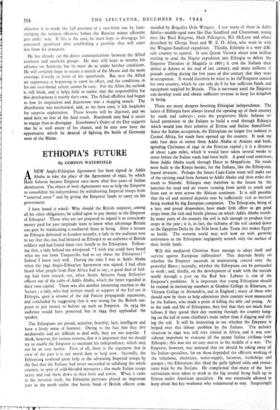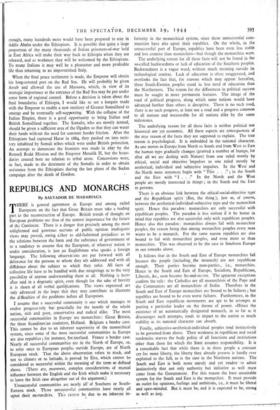ETHIOPIA'S FUTURE
By GORDON WATERFIELD ANEW Anglo-Ethiopian Agreement has been signed in Addis Ababa to take the place of the Agreement of 1942, by which Haile Selassie became Emperor once more after five years of Italian domination. The object of both Agreements was to help the Emperor to consolidate his independence by withdrawing Imperial troops from "reserved areas" and by giving the Emperor funds to carry on his government.
I have heard it asked: Why should the British taxpayer, among all his other obligations, be called upon to pay money to the Emperor of Ethiopia? Those who are not prepared to regard it as consciente money paid for past turpitude want to know what advantage Britain can gain by maintaining a mediaeval State in being. After a lecture on Ethiopia delivered in London recently, a lady in the audience rose to say that she, too, had lectured on Ethiopia to an audience of British soldiers and had found them very hostile to the Ethiopians. Follow- ing that, a lady behind me whispered. "I wish you could have heard what my son from Tanganyika had to say about the Ethiopians!" Indeed I knew very well. During the time I was in Addis Ababa when the 1942 Anglo-Ethiopian Agreement was signed, I had often heard what people from East Africa had to say ; a good deal of feel- . ing had been roused, too, when South Africans flung Ethiopian officers out of the cafés of Addis Ababa, which the latter regarded as their own capital. There was also another interesting reaction to the lecture ; a lady, who had written much in support of the Ital ans in Ethiopia, gave a résumé of the old Fascist propaganda arguments, and concluded by suggesting that it was wrong for the British tax- payer to pay money to bolster up such an Emperor. In 1934 the audience would have protested, but in 1944 they applauded the speaker.
The Ethiopians are proud, sensitive, boastful, lazy, intelligent and have a lively sense of humour. Owing to the fact that they live mediaevally and are difficult to deal with, they are not popular. I think, however, for various reasons, that it is important that we should - try to enable the Emperor to maintain his independence, which may not be an easy matter. First of all, there is the argument that in view of the past it is our moral duty to help now. Secondly, the Ethiopians rendered great help to the advancing Imperial troops by the fact that the Italians had never succeeded in subduing the whole country, in spite of cold-blooded massacres; this made Italian troops nervy and tied them down to their forts and towns. When it came to the invasion itself, the Ethiopian partisans played an important part in the north under that heroic band of British officers com- manded by Brigadier Orde Wingate. I saw many of them in Addis Ababa—middle-aged men like Dan Sandford and Cheeseman, young men like Basil Ringrose, Mark Pilkington, Bill McLean and others described by Glorge Steer and W. E. D. Allen, who went in with the Wingate-Sandford expedition. Thirdly, Ethiopia is a very diffi- cult country to control. It cost Queen Victoria about nine million sterling to send the Napier expedition into Ethiopia to defeat the Emperor Theodore at Magdala in 1867; it cost the Italians their defeat at Adowa at the end of last century, and many millions of pounds sterling during the few years of this century that they were in occupation. It would therefore be wiser to let the Emperor control his own country, which he can only do if he has sufficient funds and equipment supplied by Britain. This is necessary until the Emperor can develop trade and obtain sufficient revenue to keep his kingdom in being.
There are many dangers besetting Ethiopian independence. The 'rulers of Ethiopia have always feared the opening up of their country by roads and railways ; even the progressive Haile Selassie re- fused permission to the Italians to build a road through Ethiopia which would join their colonies of Eritrea and Italian Somaliland. Since the Italian occupation, the Ethiopians no longer live isolated in Central Africa, for roads have opened up the country. It took me only four days to motor from Addis Ababa to Asmara and back, spending Christmas of 1941 in the Eritrean capital ; it is a distance of about x,400 miles, which it would have taken several weeks to cover before the Italian roads had been built. A good road continues„ from Addis Ababa south through Harar to Mogadiscio. No roads were built to the Kenya border, for the Italians, like the Ethiopians, feared invasion. Perhaps the future Cape-Cairo route will make use of the existing road from Asmara to Addis Ababa and then strike due south to Nairobi. Ethiopia may therefore in the future be the junction for road and air routes running from north to south and from east to west across the African continent. It is still possible that the oil and mineral deposits may be sufficiently rich to warrant being worked by big European companies. The Ethiopians, being of a lazy and proud disposition, have made little effort to get good crops from the rich and fertile plateau on which Addis Ababa stands. In many parts of the country the soil is rich enough to produce four crops in the year ; it is, in fact, the richness of the soil carried down to the Egyptian Delta by the Nile from Lake Tsana that makes Egypt so fertile. The western world may well look on with growing restiveness as the Ethiopians negligently scratch only the surface of their fertile lands.
Will this mediaeval Christian State manage to adapt itself and survive against European infiltration? This depends firstly on whether the Emperor succeeds in maintaining control over the powerful Roses; secondly, whether the Ethiopians can be persuaded to work ; and, thirdly, on the development of trade with the outside world through a port on the Red Sea. Labour is one of the Emperor's problems. It is important that young Ethiopians should be trained in increasing numbers at Gordon College in Khartum, at Victoria College in Alexandria, and in England ; many of those who should now be there to help administer their country were massacred by the Italians, who made a point of killing the able and young. As to the rank and file of Ethiopians, they feel that they are much finer fellows if they spend their day running through the country hang- ing on the tail of some chieftain's mule rather than if digging and till- ing the soil. It will be interesting to see whether the Emperor is helped over this labour problem by the Italians. The military situation in 1942 was still very critical in Africa, and it was con- sidered important to evacuate all the so,000 Italian civilians from Ethiopia ; this was not an easy matter in the middle of a war. The Emperor, however, was annoyed that we should be taking away all his Italian specialists, for on them depended the efficient working of the telephone, electricity, water-supply, factories, workshops and garages ; the Ethiopians also liked the gaily lighted cafes and restau- rants kept by the Italians. He complained that many of the best technicians were taken to work in the big arsenal being built up in Eritrea under American specialists. He was eventually allowed to keep about Soo key workmen who volunteered to stay. Surprisingly
enough, many hundreds more would have been prepared to stay in Addis Ababa under the Ethiopians. It is possible that quite a large proportion of the many thousands of Italian prisoners-of-war held in East Africa will make their way back to Ethiopia when they are released, and as workmen they will be welcomed by the Ethiopians. To many Italians it may well be a pleasanter and more profitable life than returning to an impoverished Italy.
When the final peace settlement is made, the Emperor will obtain his long-coveted port on the Red Sea. He will probably be given Assab and allowed the use of Massawa, which, in view of its strategic importance at the entrance of the Red Sea may be put under some form of regional control. Before a decision is taken about the final boundaries of Ethiopia, I would like to see a bargain made with the Emperor to enable a new territory of Greater Somaliland to emerge and be eventually self-supporting. With the collapse of the Italian Empire, there is a good opportunity to bring Italian and British Somaliland together. The Somalis, who are mostly nomad, should be given a sufficient area of the Ogaden so that they can water their herds without the need for constant border friction. After the Ethiopians had captured Harar in 1884, they pushed on into terri- tory inhabited by Somali tribes which were under British protection. An attempt to demarcate the frontiers was made in 1897 by the Rennell Rodd Mission and the Emperor Menelik II, but the boun- daries created bore no relation to tribal areas. Concessions, were, in fact, made to the detriment of the Somalis in order to obtain assistance from the Ethiopians during the last phase of the Sudan campaign after the death of Gordon.



























 Previous page
Previous page